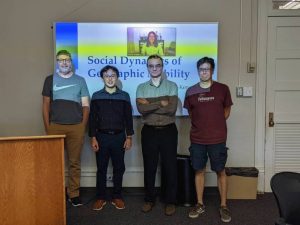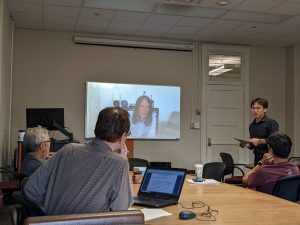Dissertation Defended, Dr. Shih-Keng Yen

Please join us in congratulating Dr. Shih-Keng Yen who defended his dissertation titled “Social Dynamics of Geographic Mobility.” Dr. Ernesto Amaral served as Shih-Keng’s mentor, the committee included Dr. Arthur Sakamoto, Dr. Pat Rubio Goldsmith, and Dr. Oi-Man Kwok (from the Department of Educational Psychology).
Dr. Yen’s dissertation examines the dynamics of social factors in motivating geographic mobility in the U.S. in three separate essays. The first essay delves into how the interrelated but opposite neighborhood status and individual status relative to the expected community socioeconomic attributes and the neighbors, respectively, shape geographic mobility. Relying on the restricted-use American Community Survey (ACS) data, the study finds that households exhibit an evident relocation tendency when possessing the highest individual status but residing in the lowest status communities, or holding the lowest individual status while in high-status neighborhoods. The second essay investigates how the local socioeconomic standing of white residents relative to their non-white neighbors, i.e., neighborhood racial status, moderates the relationship between neighborhood minority composition and white out-mobility. Utilizing the restricted-use ACS data, the study shows that when the racial status of white inhabitants is not superior to their out-group neighborhoods, the upward trend between black or Asian composition and white departure turns to be decreasingly salient, and the downward pattern along with the growth of Hispanic share becomes increasingly apparent. The study amends the conventional racial versus socioeconomic preferences framework by introducing the notion of racial status and the relevant group competition and contact theory in explaining white out-mobility. The third article looks into the trend of herd effects in attracting aggregate level population movement across localities by the publicly available ACS data. The study finds that although the effects of herd flows remain constantly positive between 2005 and 2018, the spillovers and spatial dependence plummet after the Great Recession. Thus, the role of herd effects in spurring migration flows into the destination is decreasingly diffused. The study provides an overall description of herd effects as endogenous internal dynamics to understand the evolution of the U.S. migration system.
Congratulations, Dr. Yen!
